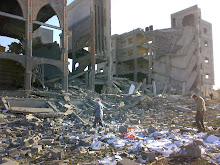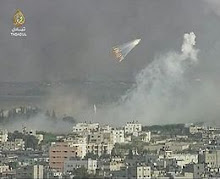UN ENVIRONMENT TEAM COMPLETES STUDY OF GAZA CONFLICT DAMAGES
Experts from the United Nations Environment Programme (UNEP) have completed field work on a study of the environmental impact of the recent heavy fighting on Gaza, the agency announced today.
The team of eight UNEP experts spent 10 days in Gaza studying waste and waste water systems, the coastal and marine environment, and solid and hazardous waste management, including asbestos, and will make recommendations for rehabilitation this in the coming months.
In the coming months, it will make recommendations which “will inform local planning and assist the planned reconstruction by the international community,” according to UNEP Executive Director Achim Steiner.
The experts inspected 32 sites to assess environmental impacts and collect samples for laboratory analysis and also collected data for an economic evaluation of the cost of rehabilitation and restoration of the environmental damage in Gaza.
Sites visited included residential areas, schools, industrial areas, sewage facilities, landfills and the coastline, where detailed sampling of water and sediments, bio-indicators, asbestos and waste water was conducted.
Samples collected on the ground will be sent to an independent international laboratory and analysed in the coming weeks.
The three-week Israeli offensive which began on 27 December, with the stated aim of ending rocket attacks by Hamas and other groups, killed at least 1,300 Palestinians and wounded some 5,300. The heavy bombardment and fighting also reduced buildings and other infrastructure to rubble.
Shortly after the conflict ended, UNEP sent a senior staff member to Gaza in late January as part of the UN Early Recovery Needs Assessment mission, which found that the fighting had created large quantities of building demolition waste, which is often contaminated with hazardous materials such as asbestos.
Even prior to this most recent conflict, Gaza did not have an appropriate system for waste segregation and disposal. Consequently, the creation of such large quantities of solid waste, within such a short time, has overloaded the already inadequate infrastructure.
During the May field mission, UNEP also ran two training workshops on handling asbestos and other hazardous substances in rubble management, and on health and safety practices for demolition and disposal of damaged buildings.
The team members have extensive experience in assessing the environmental impact of conflict in the Balkans, Afghanistan, Sudan and the Middle East, and in making recommendations for action, according to the agency. They also have expertise in water and waste water management, asbestos and hazardous wastes monitoring, and coastal and marine issues, it added.
(UN: May 21, 2009)
donderdag 21 mei 2009
woensdag 20 mei 2009
Ban Ki-moon briefed about UN rights probe into Gaza conflict
BAN BRIEFED BY HEAD OF UN RIGHTS PROBE INTO GAZA CONFLICT
Secretary-General Ban Ki-moon was briefed today by the head of the independent team of investigators tasked by the United Nations Human Rights Council with examining alleged rights abuses and violations of international law during the recent Gaza conflict.
Mr. Ban’s meeting with Justice Richard Goldstone of South Africa took place in Geneva, where the Human Rights Council is based and where the Secretary-General today wrapped up a five-day trip that also took him to Bahrain.
During the meeting, which was also attended by members of Justice Goldstone’s team and High Commissioner for Human Rights Navi Pillay, Mr. Ban reiterated his support to the work of the mission.
The Secretary-General said he hoped the mission’s work would proceed smoothly with cooperation by the concerned parties and send a positive message to the international community about accountability, according to his spokesperson.
Speaking to reporters today, Justice Goldstone said he was “disappointed” that he had not received any positive response from the Israeli Government.
He said his wish was to visit southern Israel, go into Gaza “through the front door,” and also go to the West Bank, which is to be included in his mission.
The former prosecutor for International Criminal Tribunals for the former Yugoslavia and Rwanda added that the mission was still in the planning stage, and that he would be holding a number of public hearings – hopefully in the region, but if that was not possible, then in Geneva.
Field work had to be completed by the end of June, he noted, and the team’s report will be handed over on 4 August.
(UN: May 20, 2009)
Secretary-General Ban Ki-moon was briefed today by the head of the independent team of investigators tasked by the United Nations Human Rights Council with examining alleged rights abuses and violations of international law during the recent Gaza conflict.
Mr. Ban’s meeting with Justice Richard Goldstone of South Africa took place in Geneva, where the Human Rights Council is based and where the Secretary-General today wrapped up a five-day trip that also took him to Bahrain.
During the meeting, which was also attended by members of Justice Goldstone’s team and High Commissioner for Human Rights Navi Pillay, Mr. Ban reiterated his support to the work of the mission.
The Secretary-General said he hoped the mission’s work would proceed smoothly with cooperation by the concerned parties and send a positive message to the international community about accountability, according to his spokesperson.
Speaking to reporters today, Justice Goldstone said he was “disappointed” that he had not received any positive response from the Israeli Government.
He said his wish was to visit southern Israel, go into Gaza “through the front door,” and also go to the West Bank, which is to be included in his mission.
The former prosecutor for International Criminal Tribunals for the former Yugoslavia and Rwanda added that the mission was still in the planning stage, and that he would be holding a number of public hearings – hopefully in the region, but if that was not possible, then in Geneva.
Field work had to be completed by the end of June, he noted, and the team’s report will be handed over on 4 August.
(UN: May 20, 2009)
vrijdag 8 mei 2009
UN team probing rights violations in Gaza conflict wraps up first meeting
UN TEAM PROBING RIGHTS VIOLATIONS IN GAZA CONFLICT WRAPS UP FIRST MEETING
Members of the fact-finding mission set up by the United Nations Human Rights Council to probe rights violations during the recent conflict in the Gaza Strip wrapped up a week-long meeting in Geneva today.
The four-person team is led by the former prosecutor for International Criminal Tribunals for the former Yugoslavia and Rwanda, Richard Goldstone of South Africa, who stressed the law-based approach the mission will take in preparing its report to the Geneva-based Council.
"I would like to emphasise that we will focus our investigation not on political considerations, but on an objective and impartial analysis of compliance of the parties to the conflict with their obligations under international human rights and humanitarian law, especially their responsibility to ensure the protection of civilians and non-combatants," he stated.
"I believe that an objective assessment of the issues is in the interests of all parties, will promote a culture of accountability and could serve to promote greater peace and security in the region."
During their week-long session, the team held initial meetings with a broad cross-section of stakeholders, including Member States and representatives of the UN and non-governmental organizations. It also established terms of reference and a three-month programme of work.
The mission intends to conduct visits to affected areas of Southern Israel and the occupied Palestinian territories, including Gaza, and has requested the cooperation of the Government of Israel in this regard, according to a news release.
The other members of the team include Christine Chinkin, Professor of International Law at the London School of Economics and Political Science at the University of London; Hina Jilani, Advocate of the Supreme Court of Pakistan and former Special Representative of the Secretary-General on Human Rights Defenders; and Colonel (retired from the Irish Armed Forces) Desmond Travers, member of the Board of Directors of the Institute for International Criminal Investigations (IICI).
(UN: May 8, 2009)
Members of the fact-finding mission set up by the United Nations Human Rights Council to probe rights violations during the recent conflict in the Gaza Strip wrapped up a week-long meeting in Geneva today.
The four-person team is led by the former prosecutor for International Criminal Tribunals for the former Yugoslavia and Rwanda, Richard Goldstone of South Africa, who stressed the law-based approach the mission will take in preparing its report to the Geneva-based Council.
"I would like to emphasise that we will focus our investigation not on political considerations, but on an objective and impartial analysis of compliance of the parties to the conflict with their obligations under international human rights and humanitarian law, especially their responsibility to ensure the protection of civilians and non-combatants," he stated.
"I believe that an objective assessment of the issues is in the interests of all parties, will promote a culture of accountability and could serve to promote greater peace and security in the region."
During their week-long session, the team held initial meetings with a broad cross-section of stakeholders, including Member States and representatives of the UN and non-governmental organizations. It also established terms of reference and a three-month programme of work.
The mission intends to conduct visits to affected areas of Southern Israel and the occupied Palestinian territories, including Gaza, and has requested the cooperation of the Government of Israel in this regard, according to a news release.
The other members of the team include Christine Chinkin, Professor of International Law at the London School of Economics and Political Science at the University of London; Hina Jilani, Advocate of the Supreme Court of Pakistan and former Special Representative of the Secretary-General on Human Rights Defenders; and Colonel (retired from the Irish Armed Forces) Desmond Travers, member of the Board of Directors of the Institute for International Criminal Investigations (IICI).
(UN: May 8, 2009)
Abonneren op:
Posts (Atom)

.jpg)